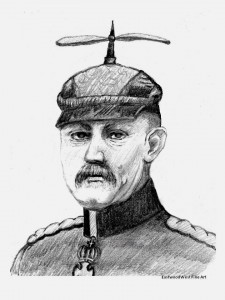Perhaps the Most Incompetent Man of All Time
Posted in General, On This Day on August 4th, 2014 by Eugene Finerman – Be the first to commentJudging from his name, Helmuth von Moltke was not the type of person whom you would want to manage a hospice or be a party planner (especially bar mitzvahs). Surprisingly, you would not want him to manage your World War. You would expect a Junker to have unjustified arrogance but not unwarranted caution, yet Helmuth did. And as the Chief of the German General Staff in 1914, he inadvertently saved France.
The Franco-Prussian War had been a leisurely affair, six months of continually humiliating the French. But that was in 1870-71, when the Germans were engaged in an one-front war and were led by a genius. (Otto von Bismarck may have been the model for Lex Luthor.) In 1914, Germany had a two-front war and was led by a blustering dolt. (Wilhelm II may have been the model for George Bush, except Wilhelm spoke excellent English.)
France and Russia made an odd couple, the equivalent alliance of Wallace Shawn and King Kong, but they shared a hatred of Germany. Anticipating a two-front war, the German General Staff planned a strategy to defeat France before the lumbering Russian army could even reach the border. Named for its architect, the von Schlieffen Plan was a timetable of conquest. France now had to fall in six weeks; and to accomplish that, Germany had to outflank the French by attacking through Belgium. Von Schlieffen wanted every possible resource to be in the German force striking through Belgium: any available soldier, any ambulatory male, boy scouts, the heaviest sopranos from Bayreuth. “Strengthen the Right Wing” was Schlieffen’s dogma and probably his politics.
Von Schlieffen had been the chief of staff of the German Army until his retirement in 1906. His position and plan were left to von Moltke, who began fretting over a possible flaw in the strategy. While the German army was attacking from the North, what if the French charged to the east–overwhelming Alsace and reaching the Rhine. Yes, it was a distinct possibility that the French could take Muhlhouse, while the Germans took Paris. It would seem that the Germans would still be ahead in that trade, but Moltke did not want to take any chance. So he reassigned forces from the Northern strike force to the apparently imperiled Rhineland.
On this day in 1914, Germany invaded Belgium. Britain, honoring a treaty with the attacked country–and appreciating an excuse to fight–then declared war on Germany. The British navy was the greatest in world, but its dreadnoughts could not navigate the streams that led to Berlin or Munich. (Coastal Hamburg, however, could have been leveled.) As for the British army–less than a tenth the size of Germany’s, it was literally a joke. Otto von Bismarck once was asked how he would respond if the British army landed in Germany; he replied “I would have a policeman arrest it.”
Von Moltke shared that contempt for the British army. When asked if he should order the German fleet to the English Channel to block the British transport of its army to France, von Moltke dismissed the idea as if it were an insult to the German army. “Let the English come. The German army will defeat them, too.” So, the German navy did nothing, and the unimpeded British fleet transported 140.000 men to France. However, von Moltke had forgotten the strict nature of the von Schlieffen timetable; 140.000 British troops really had not been factored into the Teutonically-precise schedule. Worse, the Russians were not cooperating either. Their lumbering horde was two weeks ahead of German predictions. So von Moltke now was transferring army corps to the Russian Front. (The troops were sent from Belgium; von Moltke left untouched the well-rested forces in Alsace.) He really was entitled to the Croix de Guerre. Paris was saved, the Western Front held, and von Moltke finally noticed a problem. At least, he had the good manners to have a breakdown.
Von Moltke’s ineptitude cost Germany the war, at least a quick victory. But we shouldn’t be grateful to him. We might have been much better off if the von Schlieffen Plan had succeeded, and the world had been spared the ensuing horrors. The Hapsburg Empire actually was rather endearing, and wouldn’t we be happier if the Turks were still occupying Syria, Lebanon and Iraq? As for the Second Reich, just remember the alternative–and the German voters’ taste in chancellors.
